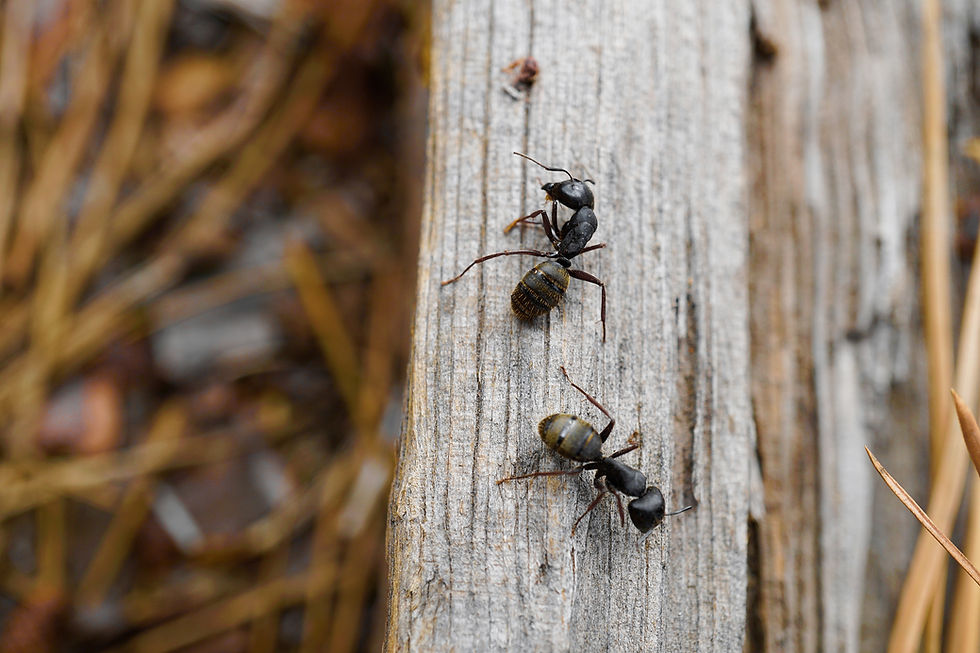Spiders in Your Home: Creepy Crawlers or Silent Protectors?
- VecPest

- Dec 31, 2024
- 4 min read

Spiders in Your Home: Creepy Crawlers or Silent Protectors?
You’re settling in for the evening, and there it is—a spider perched in the corner of your living room. Your first instinct might be to grab a tissue and send it packing, but wait! That eight-legged visitor could be one of the best roommates you never knew you had. While spiders might give you the creeps, they play a vital role in keeping your home pest-free.
In this blog, we’ll explore the world of common household spiders, uncover their benefits, and share tips on how to coexist peacefully—or encourage them to move along if you must.
1. Meet the Neighbors: Common Household Spiders
Hook: Not all spiders are created equal, and the ones in your home might be less scary than you think.
The most common spiders you’ll find indoors include the cellar spider (aka daddy longlegs), the house spider, and the jumping spider. These species are harmless to humans and prefer quiet corners where they can hunt for pests like flies, moths, and even mosquitoes.
🕷 Fun Fact: The cellar spider’s delicate web isn’t just for show—it’s a trap for flying insects that wander too close.
Practical Tip: Spot a spider web? Gently remove it with a duster, but avoid harsh chemicals that might harm beneficial spiders.
2. Nature’s Pest Control: Why Spiders Are Your Allies
Hook: Spiders are like tiny, silent exterminators—and they work for free!
Spiders are natural predators, feasting on many of the pests you don’t want in your home, such as cockroaches, ants, and flies. By keeping the spider population around, you’re reducing the need for chemical pest control solutions.
📊 Stat Spotlight: A single spider can consume up to 2,000 insects annually. That’s a lot of uninvited bugs off your walls and counters!
Practical Tip: If you’re not a fan of seeing spiders, consider keeping their favorite hiding spots (like dark corners) clear while letting them patrol elsewhere.
3. Busting Myths: Spiders Are Not Out to Get You
Hook: Think all spiders bite or are dangerous? Think again—most are completely harmless.
The majority of household spiders are non-venomous and not aggressive toward humans. Even bites from those that can bite are rare and typically occur only when the spider feels trapped or threatened. The infamous black widow and brown recluse spiders are exceptions but are relatively rare indoors.
📢 Quote: “Spiders are misunderstood creatures—they are more afraid of you than you are of them,” says arachnologist Dr. Greta Binford.
Practical Tip: Learn to identify harmful species like black widows (shiny black with a red hourglass mark) and brown recluses (with a violin-shaped marking) to ease your fears about the others.
4. Why Are Spiders Invading Your Space?
Hook: Spiders don’t just waltz into your home—they have their reasons.
Spiders seek shelter, food, and warmth, which makes homes an inviting haven, especially in cooler months. They often enter through cracks, open windows, or hitch a ride on objects brought indoors.
🔎 Expert Insight: “Homes with plentiful insects naturally attract spiders,” says Dr. Chris Buddle, an arachnologist and professor of entomology.
Practical Tip: Seal cracks, install window screens, and keep your home clean to limit their access.
5. Spider-Proofing Your Home: Coexisting Without Crawling
Hook: Not ready to embrace your eight-legged guests? You can politely show them the door.
If you’d prefer fewer spiders indoors, focus on decluttering and cleaning areas where they might hide, like basements and attics. Using essential oils like peppermint or eucalyptus can also deter spiders without harming them.
🌿 Pro Tip: Spiders hate the smell of citrus—wipe down windowsills and baseboards with lemon-scented cleaners to keep them away.
Practical Tip: Place sticky traps in discreet areas to catch spiders naturally and monitor their activity.
6. Spiders and Superstitions: Fear vs. Fascination
Hook: For centuries, spiders have spun their way into myths, fears, and even good luck symbols.
In some cultures, spiders are considered omens of wealth and prosperity, while in others, they’re feared for their appearance and habits. Modern studies show that fear of spiders, or arachnophobia, is one of the most common phobias worldwide.
📊 Stat Spotlight: Up to 6% of the global population experiences significant arachnophobia, according to the American Psychiatric Association.
Practical Tip: If you’re arachnophobic, gradual exposure to spiders in a controlled setting can help reduce fear over time.
7. When to Call in the Pros: Handling Spider Infestations
Hook: While a few spiders are helpful, too many can signal a bigger problem.
A sudden increase in spider sightings might mean your home has an abundance of insects attracting them. In rare cases, it could indicate the presence of venomous species. If you’re unsure, it’s best to call a pest control professional for advice.
📢 Quote: “Spiders are a sign of a healthy ecosystem, but infestations should be addressed carefully,” says pest management expert Dr. Brittany Campbell.
Practical Tip: Use eco-friendly pest control services to manage spider populations while protecting the environment.
Wrapping Up: Spiders as Silent Guardians
While spiders might not top your list of favorite houseguests, their role as natural pest controllers makes them valuable allies. By understanding their habits and benefits, you can find ways to coexist—or manage their presence respectfully.
The next time you spot a spider in your home, remember: it’s not out to scare you—it’s on your side in the battle against bugs. And who knows? You might just come to appreciate the quiet hero spinning its web in your corner.





Comments